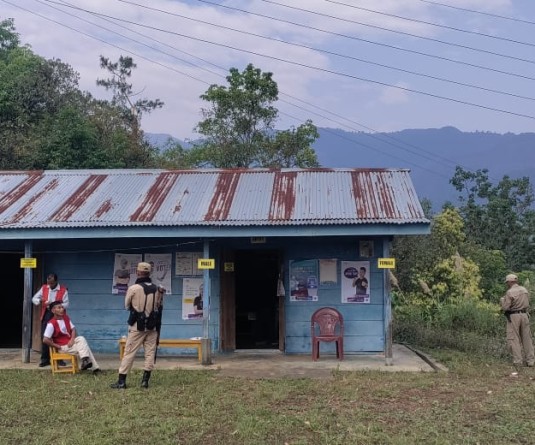
Dimapur, May 12 (MExN): The Government of Nagaland has issued an order today clamping all moves by any group, organizations or communities or individuals as a means to settle disputes and scores. While implementing its own order has yet to be seen, the government noted strongly that ‘several recent instances’ in various parts of the state where village communities, NGOs or a group of people resorted to road blocks, ban on vehicular movement or restrictions on the use of highways, public roads and public properties to settle local disputes and differences. “Such activities have serious implications for maintenance of Rule of Law and of public order in the state,” the government stated in the order.
The chief secretary of Nagaland appended the order.
The government reminded that the government constructs all roads in the state viz., national and state highways, district roads and other public roads by using public funds to provide infrastructure for the use of all members of the public for movement without obstruction from any quarter.
“While acknowledging ownership of land by individuals, villages and communities in the state, it is hereby notified for information of all concerned that resorting to arbitrary road blockages on any national or state highway, or district road or any other public road as a means to settle inter-community/ inter-village/ inter-group disputes on the basis of landownership is unlawful,” the government stated.
Road blockages, ban, or restrictions on movement of people on public highways and other public roads being ipso facto unlawful, the order stated, any village, community, NGO or group resorting to recourse in connection with inter village, inter-community or inter-group disputes is liable for punishment under relevant provisions of Law. The perpetrators shall also be liable to be denied benefits of the developmental schemes of the Government, the order stated. In addition, they may be further liable for recovery of the cost of restoring damages that may be caused to the roads or public property because of such unlawful activities.
Deputy commissioners, additional deputy commissioners of the districts are already vested with legal and administrative powers under the Criminal Procedure Code (CrPC), the ‘Rules of Administration and Justice 1937’, the Nagaland Security Regulation 1962 (Section 2 (12) (e) (ii), the Assam Maintenance of Public Order (Autonomous District) Acts 1953 (Section 7- collection of fines) to deal with such activities. In addition, the Village Councils and GBs in the villages are legally bound to assist the district administration in maintenance of law and order and to prevent unlawful activities in their respective jurisdictions.
DCs, ADCs and other administrative officers vested with magisterial powers are directed to take prompt action to declare such activities unlawful under the relevant provisions of law and take with legal action against the perpetrating village, community or group. “Cases should be registered under the appropriate sections of the law and the same should be promptly investigated,” the order stated. This order should also be brought to the notice of all administrative officers, village councils, ‘hohos’, and other concerned NGOs in the state, the government added.
The chief secretary of Nagaland appended the order.
The government reminded that the government constructs all roads in the state viz., national and state highways, district roads and other public roads by using public funds to provide infrastructure for the use of all members of the public for movement without obstruction from any quarter.
“While acknowledging ownership of land by individuals, villages and communities in the state, it is hereby notified for information of all concerned that resorting to arbitrary road blockages on any national or state highway, or district road or any other public road as a means to settle inter-community/ inter-village/ inter-group disputes on the basis of landownership is unlawful,” the government stated.
Road blockages, ban, or restrictions on movement of people on public highways and other public roads being ipso facto unlawful, the order stated, any village, community, NGO or group resorting to recourse in connection with inter village, inter-community or inter-group disputes is liable for punishment under relevant provisions of Law. The perpetrators shall also be liable to be denied benefits of the developmental schemes of the Government, the order stated. In addition, they may be further liable for recovery of the cost of restoring damages that may be caused to the roads or public property because of such unlawful activities.
Deputy commissioners, additional deputy commissioners of the districts are already vested with legal and administrative powers under the Criminal Procedure Code (CrPC), the ‘Rules of Administration and Justice 1937’, the Nagaland Security Regulation 1962 (Section 2 (12) (e) (ii), the Assam Maintenance of Public Order (Autonomous District) Acts 1953 (Section 7- collection of fines) to deal with such activities. In addition, the Village Councils and GBs in the villages are legally bound to assist the district administration in maintenance of law and order and to prevent unlawful activities in their respective jurisdictions.
DCs, ADCs and other administrative officers vested with magisterial powers are directed to take prompt action to declare such activities unlawful under the relevant provisions of law and take with legal action against the perpetrating village, community or group. “Cases should be registered under the appropriate sections of the law and the same should be promptly investigated,” the order stated. This order should also be brought to the notice of all administrative officers, village councils, ‘hohos’, and other concerned NGOs in the state, the government added.




